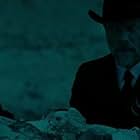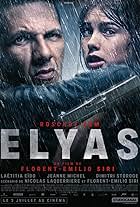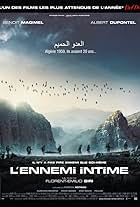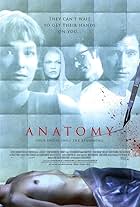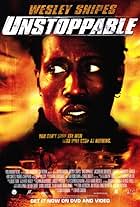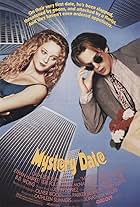VALUTAZIONE IMDb
6,7/10
5807
LA TUA VALUTAZIONE
Le alleanze cambiano quando un'auto blindata con un boss della mafia albanese prigioniero sfugge a un esercito mafioso guidando all'interno di un magazzino, che viene derubato da una banda f... Leggi tuttoLe alleanze cambiano quando un'auto blindata con un boss della mafia albanese prigioniero sfugge a un esercito mafioso guidando all'interno di un magazzino, che viene derubato da una banda francese che ruba computer ecc.Le alleanze cambiano quando un'auto blindata con un boss della mafia albanese prigioniero sfugge a un esercito mafioso guidando all'interno di un magazzino, che viene derubato da una banda francese che ruba computer ecc.
Foto
Frédéric Maranber
- Militaire
- (as Frederic Maranber)
Éric Franquelin
- Le capitaine
- (as Eric Franquelin)
Bibi Naceri
- Employé Ponts et Chaussées
- (as Larbi Naceri)
Trama
Lo sapevi?
- QuizLoosely inspired by John Carpenter's "Assault on Precint 13".
- BlooperWhen Martial uses the remote to turn the Liebherr telescopic crane, you can see the jib attached to the right side of the boom. Seconds later, when he extends the boom, the jib is attached to the front of the boom. Aside from the necessary time and space, it is not possible for only one person to attach the jib. Also, the engine of the crane is turned off so the entire operation would not be possible.
- Versioni alternativeThe end credits on the French DVD has the character photos in color and the credits itself in white. However, the French Blu-ray has the character photos in Black & White and the credits itself in red.
- ConnessioniReferenced in Hostage (2005)
Recensione in evidenza
For some people the words 'French' and 'Action Movie' will do nothing but produce guffaws. Pay no attention; they know nothing about the lengthy history of superb French Action Films. The French actually produce some good movies from time to time. They are not all pretentious 'Arthouse' flicks which involve lots of shagging and boring dialogue.
Jean-Pierre Jeunet gave us Delicatessen and 'The City of Lost Children' - he then made 'Alien:Resurrection' but we forgave him when he delivered 'Amelie'. Then there is Luc Besson who gave us 'Subway', 'Nikita' as a warm up then the fabulous 'Leon' ('The Professional' in the US) and the superb 'Fifth Element'. If you check the production companies involved on those last two you will find that they are entirely French, only US distributors were involved. Besson has sort-of disappeared from movie making for a while, concentrating on producing and writing cheapo European action films like 'The Transporter' and 'Taxi' 1&2 (not the lame US remakes).
The reason for this lengthy preamble is to point out that not all French films are dull, and illustrate the fact that actually the French have a lot to teach a jaded Hollywood in how to make action movies. Which brings me to 'The Nest'.
I watched John Carpenter's fantastic 'Assault on Precinct 13' when I was probably 15 and bored one evening. I didn't know anything about Carpenter, the film had no recognizable stars and I had no idea what was going to happen. Needless to say the film is excellent. It was the first time in my cinema going life that I felt not just wonder when watching a film, but also claustrophobia, oppression and genuine fear. 'The Nest' is a total remake of 'Assault'. It doesn't hang about (though its setup is maybe a little longer and a smidge wider-ranging than Assault's), introducing three groups of characters so quickly that you genuinely have no idea what they are up to.
Sami Naceri, the star of the hugely daft Taxi films, is best known as a comic actor, yet plays successfully against type here (why isn't he a star on the same level as Jean Reno by now?)Pascal Greggory has the looks and presence of a hit-man, but is actually a security guard, Nadia Fares looks like a catwalk model, but utterly convinces as the military enforcer. The lesser characters (which isn't really fair as this is a purely ensemble piece of work) all inhabit their characters completely, their complex relationships spark off believable dialogue that never once slips into cliché. It is this commitment to reality that underlines 'The Nest' and makes it so successful.
Almost the entire film takes place in a single warehouse, which is similar to 'Assault' except that Carpenter's film had a number of locations within the police house. The Nest has three areas - a Boiler room, a security desk that has a clear view over the entire warehouse, and the warehouse itself. Although this lessens the claustrophobia somewhat, it is hugely successful in putting all of our characters in peril at once. Another twist is that in 'Assault' the characters can retreat through to another room of the building. Early on in 'The Nest' it becomes clear that their only area of retreat has already been compromised by the enemy.
The warehouse almost becomes a character itself, as the film becomes more and more desperate, the lights are removed and the shadows glower and threaten. Only bullet holes let in any more light, leaving shafts of light to taunt the stars with the hope they may get out of this alive.
This realism (which isn't entirely there in the plot TBH), extends to wounds. A character is shot in the thigh early on in the film and spends the rest of the film limping painfully about. Other characters are injured throughout the events and stay injured, they don't suddenly find the ability to fire guns after being shot in the shoulder. This is gritty film-making and helps make 'The Nest' so successful. It feels real, you don't know what characters are going to make it or not. This leads to genuine tension. We may have seen the story before (wounded character stays behind to protect his friends; scared character finds the inner strength to confront the enemies head on), but its presentation here feels exciting and, if not exactly fresh, new.
Another major lesson that Hollywood should learn from this film is the way it looks. There are some magic shots in here - a standout is an exact remake of Charlie Sheen's airlift from the Jungle in Platoon (!) - which not only looks great, and is genuinely unusual, but also adds greatly to our understanding of the character involved.
'The Nest' is not original, it is also not high art. It is an extremely solid action picture that is unusually exciting and tense. The director, Florent-Emilio Siri, conjures up desperation, hopelessness and genuine evil from his group of talented character actors as well as successfully re-creating Carpenter's feeling of an unstoppable army out to get them. The idea that the villains are insectile and swarming around outside highlighted by the low-light headgear they all wear is interesting and well illustrated. Siri got the gig directing Bruce Willis in 'Hostage', which is interesting as I would genuinely rate 'The Nest' alongside Willis' 'Die Hard' as examples of how to do an action movie well. It really is that good.
Jean-Pierre Jeunet gave us Delicatessen and 'The City of Lost Children' - he then made 'Alien:Resurrection' but we forgave him when he delivered 'Amelie'. Then there is Luc Besson who gave us 'Subway', 'Nikita' as a warm up then the fabulous 'Leon' ('The Professional' in the US) and the superb 'Fifth Element'. If you check the production companies involved on those last two you will find that they are entirely French, only US distributors were involved. Besson has sort-of disappeared from movie making for a while, concentrating on producing and writing cheapo European action films like 'The Transporter' and 'Taxi' 1&2 (not the lame US remakes).
The reason for this lengthy preamble is to point out that not all French films are dull, and illustrate the fact that actually the French have a lot to teach a jaded Hollywood in how to make action movies. Which brings me to 'The Nest'.
I watched John Carpenter's fantastic 'Assault on Precinct 13' when I was probably 15 and bored one evening. I didn't know anything about Carpenter, the film had no recognizable stars and I had no idea what was going to happen. Needless to say the film is excellent. It was the first time in my cinema going life that I felt not just wonder when watching a film, but also claustrophobia, oppression and genuine fear. 'The Nest' is a total remake of 'Assault'. It doesn't hang about (though its setup is maybe a little longer and a smidge wider-ranging than Assault's), introducing three groups of characters so quickly that you genuinely have no idea what they are up to.
Sami Naceri, the star of the hugely daft Taxi films, is best known as a comic actor, yet plays successfully against type here (why isn't he a star on the same level as Jean Reno by now?)Pascal Greggory has the looks and presence of a hit-man, but is actually a security guard, Nadia Fares looks like a catwalk model, but utterly convinces as the military enforcer. The lesser characters (which isn't really fair as this is a purely ensemble piece of work) all inhabit their characters completely, their complex relationships spark off believable dialogue that never once slips into cliché. It is this commitment to reality that underlines 'The Nest' and makes it so successful.
Almost the entire film takes place in a single warehouse, which is similar to 'Assault' except that Carpenter's film had a number of locations within the police house. The Nest has three areas - a Boiler room, a security desk that has a clear view over the entire warehouse, and the warehouse itself. Although this lessens the claustrophobia somewhat, it is hugely successful in putting all of our characters in peril at once. Another twist is that in 'Assault' the characters can retreat through to another room of the building. Early on in 'The Nest' it becomes clear that their only area of retreat has already been compromised by the enemy.
The warehouse almost becomes a character itself, as the film becomes more and more desperate, the lights are removed and the shadows glower and threaten. Only bullet holes let in any more light, leaving shafts of light to taunt the stars with the hope they may get out of this alive.
This realism (which isn't entirely there in the plot TBH), extends to wounds. A character is shot in the thigh early on in the film and spends the rest of the film limping painfully about. Other characters are injured throughout the events and stay injured, they don't suddenly find the ability to fire guns after being shot in the shoulder. This is gritty film-making and helps make 'The Nest' so successful. It feels real, you don't know what characters are going to make it or not. This leads to genuine tension. We may have seen the story before (wounded character stays behind to protect his friends; scared character finds the inner strength to confront the enemies head on), but its presentation here feels exciting and, if not exactly fresh, new.
Another major lesson that Hollywood should learn from this film is the way it looks. There are some magic shots in here - a standout is an exact remake of Charlie Sheen's airlift from the Jungle in Platoon (!) - which not only looks great, and is genuinely unusual, but also adds greatly to our understanding of the character involved.
'The Nest' is not original, it is also not high art. It is an extremely solid action picture that is unusually exciting and tense. The director, Florent-Emilio Siri, conjures up desperation, hopelessness and genuine evil from his group of talented character actors as well as successfully re-creating Carpenter's feeling of an unstoppable army out to get them. The idea that the villains are insectile and swarming around outside highlighted by the low-light headgear they all wear is interesting and well illustrated. Siri got the gig directing Bruce Willis in 'Hostage', which is interesting as I would genuinely rate 'The Nest' alongside Willis' 'Die Hard' as examples of how to do an action movie well. It really is that good.
I più visti
Accedi per valutare e creare un elenco di titoli salvati per ottenere consigli personalizzati
- How long is The Nest?Powered by Alexa
Dettagli
- Data di uscita
- Paese di origine
- Lingue
- Celebre anche come
- The Nest
- Luoghi delle riprese
- Rond-point, Hauts-de-Cergy, Cergy, Val-d'Oise, Francia(convoy robbery)
- Aziende produttrici
- Vedi altri crediti dell’azienda su IMDbPro
Botteghino
- Lordo in tutto il mondo
- 1.941.471 USD
- Tempo di esecuzione1 ora 47 minuti
- Colore
- Mix di suoni
- Proporzioni
- 2.35 : 1
Contribuisci a questa pagina
Suggerisci una modifica o aggiungi i contenuti mancanti

Divario superiore
By what name was Nido di vespe (2002) officially released in Canada in English?
Rispondi



